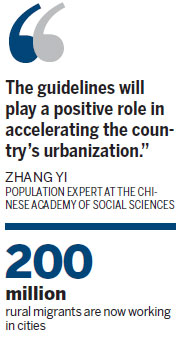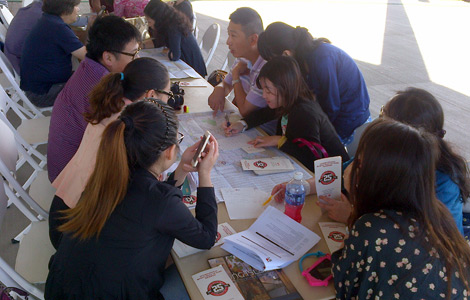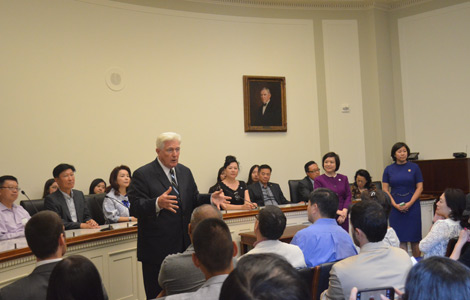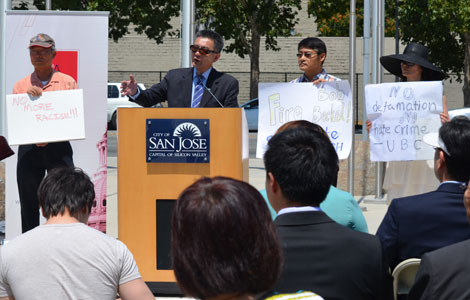Reforming hukou will unify rights of migrants
Updated: 2014-07-31 06:56
By Zhang Yan and Wang Qian (China Daily USA)
|
||||||||
Rural workers will gain access to health, education benefits in cities
Chinese migrant workers living in cities will gradually have full access to schools and hospitals where they work, a significant move to improve social equality between rural and urban residents.
Under guidelines to create a unified household registration system, known as hukou, the dual-household system that has divided people into urban or agricultural households since the 1950s will be phased out. In its place, a system of residence permits will be set up to allow qualified migrants to enjoy urban services.
"The guidelines will play a positive role in accelerating the country's urbanization," said Zhang Yi, a population expert at the Chinese Academy of Social Sciences, by creating attractive conditions for new rural residents to come to urban areas.
The guidelines said basic public services - including education, healthcare, social insurance, employment, aged care and housing - will be expanded to migrants' children.
"It will bring massive opportunities," Zhang said, adding that it will require large government spending on schools, hospitals, roads and housing.
Huang Ming, vice-minister of public security, agreed that the reform will be unprecedented regarding its scale, coverage, measures and the resolution of the central government.
More than 200 million rural migrants are now working in cities and the numbers are increasing, Huang said. 
According to a national plan in speeding up urbanization, the country intends to subsidize vocational training for all rural migrants by 2020.
Liu Limin, vice-minister of education, said that in the past three years more than 3 million migrant children have entered kindergartens in cities, and 28 provinces and regions are unveiling or discussing policies to give migrant students access to the college entrance examination.
Besides education, Wang Pei'an, vice-minister of the National Health and Family Planning Commission, said a community-based healthcare system has been established in cities with 8,488 community medical care centers built across the country by the end of 2013.
The guideline also said the expansion of the country's megacities including Beijing and Shanghai will be limited.
Initially, Huang said, the country will take effective measures, such as a point system based on applicants' living and employment conditions, to scientifically control the flow of its population to the major cities.
Contact the writer at zhangyan1@chinadaily.com.cn
(China Daily USA 07/31/2014 page1)

 Jobs hunting
Jobs hunting
 Happy homecoming for retired ambassador
Happy homecoming for retired ambassador
 New York state seeks Chinese tourists
New York state seeks Chinese tourists
 Leadership foundation brings young ambassadors to DC
Leadership foundation brings young ambassadors to DC
 Panda North American film festival opens for submissions
Panda North American film festival opens for submissions
 Lavender farm has right scent to lure Chinese tourists
Lavender farm has right scent to lure Chinese tourists
 Pleas for help on murder case
Pleas for help on murder case
 Silicon Valley rally calls on Fox News to fire Beckel
Silicon Valley rally calls on Fox News to fire Beckel
Most Viewed
Editor's Picks

|

|

|

|

|

|
Today's Top News
Multinational bribery cases on the rise
Alibaba may buoy mobile portfolio
'Drill isn't targeting any nation'
Reforming hukou will unify rights of migrants
Oil stocks rally on news of probe
Firm to build $1.85bn plant in US
Microsoft responds to anti-monopoly probe
Alibaba reportedly to fund Snapchat
US Weekly

|

|






